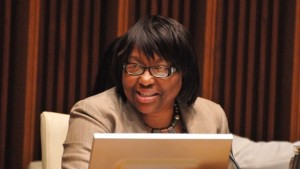 Pan American Health Organization Director Carissa F. Etienne provided reassurance about the effectiveness of COVID-19 vaccines despite circulation in the Americas of new variants of the SARS-CoV-2 virus that causes the disease.
Pan American Health Organization Director Carissa F. Etienne provided reassurance about the effectiveness of COVID-19 vaccines despite circulation in the Americas of new variants of the SARS-CoV-2 virus that causes the disease.
“So far, PAHO has found that the impact of variants of concern on the effectiveness of vaccines for COVID-19 has been minimal,” Dr. Etienne told reporters at her weekly media briefing.
However, variants increase the need to improve access to vaccines in Latin and Caribbean, she added. “Very few places are benefiting from the full potential of vaccines as there is a huge access gap in our region,” she said. “This is unacceptable, and the emergence of variants makes it even more urgent that we accelerate supply to the places with the highest transmission.”
She added that PAHO has been tracking COVID-19 virus variants since June 2020, when it created the Genomic Surveillance Regional Network. The network has shared more than 52,000 viral sequences from Latin America and the Caribbean and continues to monitor variants of concern in 43 countries and territories that have detected the Alpha variant.
So far, 18 countries have reported cases of the Beta variant; 29 countries have reported cases of the Gamma variant, and 14 have reported cases of the Delta variant, including Argentina, Aruba, Brazil, Canada, Chile, French Guiana, Guadeloupe, Martinique, Mexico, Puerto Rico, USA, Barbados, Peru and Sint Maarten, Dr. Etienne detailed.
Turning to the continuing increase in COVID-19 cases in Latin American and Caribbean countries, Dr. Etienne said that countries in the Americas last week alone reported 1.1 million new COVID-19 infections and 30,000 deaths, bringing the total case count to more than 72 million and deaths to nearly 1.9 million.
“Disruptions to essential health services are still widespread across the region, with 29 countries reporting disruptions to almost half of all services,” Dr. Etienne said. “Despite this worrisome picture, just one in ten people in Latin American and the Caribbean have been fully vaccinated against COVID-19.”
“The public health impact of vaccination is undeniable – and we are seeing it in places with high coverage. As more people get vaccinated, fewer fall severely ill. Eventually this will have an impact on transmission, keeping us all safe,” she noted.
She also addressed the fresh challenges presented by new seasons in Latin America and the Caribbean. “Now may not be the ideal time for travel – especially in places with active outbreaks or where hospital capacity may be limited,” she warned. Countries facing hurricane season should bolster “coordination among the public health, civil protection and emergency teams that could be called on to act in the event of a storm.”
She urged countries to use effective alert systems and consider outfitting hospitals and expanding shelters to reduce the potential for transmission, including among family members, since social distancing and proper ventilation will become difficult in the context of a storm.
In the Southern Hemisphere, where influenza season has started, countries should bolster surveillance systems to monitor the spread of respiratory viruses, including COVID-19, and focus on the proven public health measures such as washing hands and wearing masks. She noted that more than 13 countries have started seasonal influenza vaccination campaigns and over 80 million people have already been protected. “But we still have a lot to do to limit transmission of COVID and other respiratory diseases,” Dr. Etienne said.
The PAHO Director also thanked the United States for its donations of vaccines to Latin America and the Caribbean, saying she hoped other countries follow suit “so that we can expand access to vaccines as soon as possible.”
